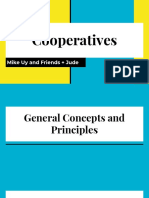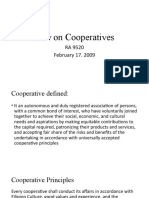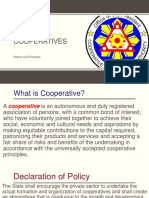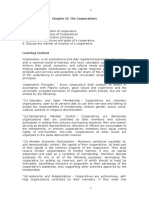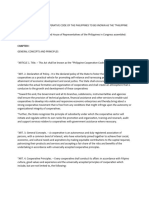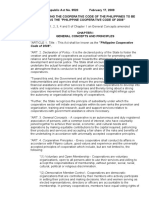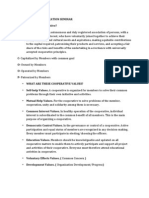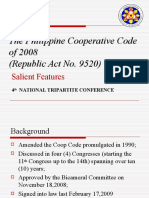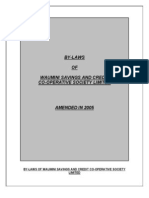0 ratings0% found this document useful (0 votes)
82 viewsPhilippine Cooperative Code of 2008 (RA 9520) : Title of The Act
Philippine Cooperative Code of 2008 (RA 9520) : Title of The Act
Uploaded by
Erica UyThe document summarizes the Philippine Cooperative Code of 2008 and the Cooperative Development Authority (CDA) Republic Act No. 6939. The summary is:
The Cooperative Code defines cooperatives as voluntary associations that are democratically controlled by members to meet common economic, social, and cultural needs. The Code establishes principles of open membership, democratic member control, member economic participation, autonomy and independence, education and training, cooperation among cooperatives, and concern for community. The CDA is tasked with formulating cooperative development plans, providing training and assistance, registering cooperatives, and administering grants to strengthen cooperatives.
Copyright:
© All Rights Reserved
Available Formats
Download as PPTX, PDF, TXT or read online from Scribd
Philippine Cooperative Code of 2008 (RA 9520) : Title of The Act
Philippine Cooperative Code of 2008 (RA 9520) : Title of The Act
Uploaded by
Erica Uy0 ratings0% found this document useful (0 votes)
82 views34 pagesThe document summarizes the Philippine Cooperative Code of 2008 and the Cooperative Development Authority (CDA) Republic Act No. 6939. The summary is:
The Cooperative Code defines cooperatives as voluntary associations that are democratically controlled by members to meet common economic, social, and cultural needs. The Code establishes principles of open membership, democratic member control, member economic participation, autonomy and independence, education and training, cooperation among cooperatives, and concern for community. The CDA is tasked with formulating cooperative development plans, providing training and assistance, registering cooperatives, and administering grants to strengthen cooperatives.
Original Description:
Cooperative Gen Principles
Original Title
Coop
Copyright
© © All Rights Reserved
Available Formats
PPTX, PDF, TXT or read online from Scribd
Share this document
Did you find this document useful?
Is this content inappropriate?
The document summarizes the Philippine Cooperative Code of 2008 and the Cooperative Development Authority (CDA) Republic Act No. 6939. The summary is:
The Cooperative Code defines cooperatives as voluntary associations that are democratically controlled by members to meet common economic, social, and cultural needs. The Code establishes principles of open membership, democratic member control, member economic participation, autonomy and independence, education and training, cooperation among cooperatives, and concern for community. The CDA is tasked with formulating cooperative development plans, providing training and assistance, registering cooperatives, and administering grants to strengthen cooperatives.
Copyright:
© All Rights Reserved
Available Formats
Download as PPTX, PDF, TXT or read online from Scribd
Download as pptx, pdf, or txt
0 ratings0% found this document useful (0 votes)
82 views34 pagesPhilippine Cooperative Code of 2008 (RA 9520) : Title of The Act
Philippine Cooperative Code of 2008 (RA 9520) : Title of The Act
Uploaded by
Erica UyThe document summarizes the Philippine Cooperative Code of 2008 and the Cooperative Development Authority (CDA) Republic Act No. 6939. The summary is:
The Cooperative Code defines cooperatives as voluntary associations that are democratically controlled by members to meet common economic, social, and cultural needs. The Code establishes principles of open membership, democratic member control, member economic participation, autonomy and independence, education and training, cooperation among cooperatives, and concern for community. The CDA is tasked with formulating cooperative development plans, providing training and assistance, registering cooperatives, and administering grants to strengthen cooperatives.
Copyright:
© All Rights Reserved
Available Formats
Download as PPTX, PDF, TXT or read online from Scribd
Download as pptx, pdf, or txt
You are on page 1of 34
Philippine Cooperative
Code of 2008 (RA 9520)
Title of the Act
General Concept (Art. 3)
• A cooperative is:
• an autonomous duly registered association of persons
• with common bond of interest
• who have voluntarily joined together to achieve their social,
economic, and cultural needs and aspirations
• making equitable distributions to the capital required patronizing
their products and services and
• accepting a fair share of the risks and benefits of the undertaking
in accordance with universally accepted cooperatives principles.”
Cooperative Principles (Art 4)
A. Voluntary and Open Membership
open to all persons
able to use their services and
willing to accept the responsibilities of membership
without gender, social, racial, cultural, political or religious
discrimination
Cooperative Principles
B. Democratic Member Control
Controlled by their members who actively participate in
setting their policies and making decisions
With elected representatives, directors or officers are
accountable to the membership
Equal voting rights: one member, one vote
Cooperative Principles
C. Member Economic Participation
Members contribute equitably and democratically control the cooperative’s
capital
They shall receive limited compensation or limited interest, if any, on capital
subscribed and paid up as a condition of membership
Members allocate surpluses for any or all of the following purposes:
o developing the cooperative by setting up reserves,
o part of which should at least be indivisible;
o benefitting members in proportion to their patronage of the cooperative’s business;
and,
o supporting other activities approved by the membership
Cooperative Principles
C. Autonomy and Independence
When entering into agreements with other organizations
(including government) or raise capital from external
sources
o they shall do so on terms that ensure democratic control of
their members and maintain their cooperative autonomy.
Cooperative Principles
D. Education, Training, and Information
Cooperatives shall provide education and training for their
members, elected and appointed representatives,
managers, and employees
o To contribute effectively and efficiently to the development of
their cooperatives.
Cooperative Principles
E. Cooperation Among Cooperatives
Cooperatives serve their members most effectively
and strengthen the cooperative movement
oby working together through local, national, regional
and international structures
Cooperative Principles
F. Concern for Community
work for the sustainable development of their
communities through policies approved by their members
Definition of Terms (Art. 5)
• Member
oincludes a person either natural or juridical
oadhering to the principles set forth in this Code and
oin the articles of cooperation, has been admitted by the
cooperative as member
Definition of Terms
• General Assembly
o the full membership of the cooperative duly assembled for the
purpose of exercising all the rights and
o performing all the obligations pertaining to cooperatives, as provided
by this Code, its articles of cooperation and bylaws
o Provided, That for cooperatives with numerous and dispersed
membership,
the general assembly may be composed of delegates elected by each sector,
chapter or district of the cooperative in accordance with the rules and
regulations of the Cooperative Development Authority:
Definition of Terms
• Board of Directors
obody entrusted with the management of the affairs of the
cooperative under its articles of cooperation and bylaws;
• Committee
oany body entrusted with specific functions and
responsibilities under the bylaws or resolution of the
general assembly or the board of directors
Definition of Terms
• Articles of Cooperation
othe articles of cooperation registered under this Code and
includes a registered amendment thereof;
• Bylaws
othe bylaws registered under this Code and includes any
registered amendment thereof;
Definition of Terms
• Registration
oThe operative act granting juridical personality to a
proposed cooperative and is evidenced by a certificate of
registration
• Cooperative Development Authority
oThe government agency in charge of the registration and
regulation of cooperatives as such, hereinafter referred to
as the Authority
Definition of Terms
• Universally Accepted Principles
o Body of cooperative principles adhered to worldwide by
cooperatives;
• Representative Assembly
o The full membership of a body of representatives elected by each
of the sectors, chapter or district of the cooperative duly
assembled
o For the purpose of exercising such powers lawfully delegated nntc
them by the general assembly in accordance with its bylaws
Definition of Terms
• Social Audit
oA procedure wherein the cooperative assesses its social impact
and ethical performance vis-&visits stated mission, vision, goals
and code of social responsibility for cooperatives to be established
by the Authority in consultation with the cooperative sector.
oEnables the cooperatives to develop a process whereby it can
account for its social performance
oEvaluate its impact in the community and be accountable for its
decisions and actions to its regular members
Definition of Terms
• Performance Audit
oAn audit on the efficiency and effectiveness of the
cooperative as a whole; its management and officers; and
its various responsibility centers as basis for improving
individual, team or overall performance and for
objectively informing the general membership on such
performance
Definition of Terms
• Single-line or Single-purpose Cooperative
oCooperative undertaking activities which are related to its
main line of business or purpose
• Service Cooperatives
o Provide any type of service to its members, including but
not limited to: transport, information and
communication, insurance, housing, electric, health
services, education, banking, and savings and credit
Definition of Terms
• Subsidiary Cooperative
oAny organization all or majority of whose membership or
shareholders come from a cooperative
o organized for any other purpose different from that of,
oreceives technical, managerial and financial assistance
from, a cooperative, in accordance with the rules and
regulations of the Authority
Definition of Terms
• Federation of Cooperatives
othree or more primary cooperatives
odoing the same line of business
oorganized at the municipal, provincial, city, special
metropolitan political subdivision, or economic zones
created by law
oregistered with the authority to undertake business
activities in support of its member-cooperatives
COOPERATIVE
DEVELOPMENT
AUTHORITY (CDA)
REPUBLIC ACT NO. 6939
Powers, Functions and
Responsibilities (Sec 3)
a. Formulate, adopt and implement integrated and comprehensive plans and
programs on cooperative development consistent with the national policy on
cooperatives and the overall socioeconomic development plans of the
Government
b. Develop and conduct management and training programs upon request of
cooperatives that will provide members of cooperatives with the
entrepreneurial capabilities, managerial expertise, and technical skills required
for the efficient operation of their cooperatives and inculcate in them the true
spirit of cooperativism and provide, when necessary, technical and professional
assistance to ensure the viability and growth of cooperatives with special
concern for agrarian reform, fishery and economically depressed sectors
Powers, Functions and
Responsibilities (Sec 3)
c. Support the voluntary organization and consensual development of
activities that promote cooperative movements and provide
assistance towards upgrading managerial and technical expertise
upon request of the cooperatives concerned
d. Coordinate the efforts of the local government units and the private
sector in promotion, organization, and development of cooperatives
Powers, Functions and
Responsibilities (Sec 3)
e. Register all cooperatives and their federations and unions, including
their division, merger, consolidation, dissolution or liquidation. It
shall also register the transfer of all or substantially all of their
assets and liabilities and such other matters as may be required by
the Authority
f. Require all cooperatives, their federations and unions to submit
their annual financial statements, duly audited by certified public
accountants, and general information sheets
Powers, Functions and
Responsibilities (Sec 3)
g. Order the cancellation after due notice and hearing of the
cooperative's certificate of registration for non-compliance with
administrative requirements and in cases of voluntary dissolution
h. Assist cooperatives in arranging for financial and other forms of
assistance under such terms and conditions as are calculated to
strengthen their viability and autonomy
i. Establish extension offices as may be necessary and financially
viable to implement this Act. Initially, there shall be extension
offices in the Cities of Dagupan, Manila, Naga, Iloilo, Cebu, Cagayan
de Oro and Davao
Powers, Functions and
Responsibilities (Sec 3)
j. Impose and collect reasonable fees and charges in connection with
the registration of cooperatives
k. Administer all grants and donations coursed through the
Government for cooperative development, without prejudice to the
right of cooperatives to directly receive and administer such grants
and donations upon agreement with the grantors and donors
thereof
l. Formulate and adopt continuing policy initiatives consultation with
the cooperative sector through public hearing
Powers, Functions and
Responsibilities (Sec 3)
m. Adopt rules and regulations for the conduct of its internal operations
n. Submit an annual report to the President and Congress on the state of the
cooperative movement
o. Exercise such other functions as may be necessary to implement the provisions
of cooperative laws and, in the performance thereof, the Authority may
summarily punish for direct contempt any person guilty of misconduct in the
presence of the Authority which seriously interrupts any hearing or inquiry with
a fine of not more than Five hundred pesos (P500.00) or imprisonment of not
more than ten (10) days, or both. Acts constituting indirect contempt as defined
under Rule 71 of the Rules of Court shall be punished in accordance with the
said Rule
Governing Body (Sec 4)
Board of Administrators consisting:
• 1 Chairman and 6 members to be appointed by the President
• all shall be chosen from among the nominees of the cooperative sector with 2
representatives each from Luzon, Visayas and Mindanao.
• Shall serve for a term of six (6) years without reappointment
• Provided, That among those first appointed, the Chairman shall serve for a term of 6 years, 3
members to serve for 4 years, and 3 members to serve 2 years:
• Provided, there shall be 4 ex officio members, 1 each from the:
(a) Department of Agriculture
(b) (b) Department of Transportation and Communications
(c) (c) National Electrification Administration, and
(d) (d) Sugar Regulatory Administration.
Governing Body (Sec 4)
• Representation status for the agencies is:
• on a nonvoting basis
• terminates one (1) year from the operation of the Authority
• Ex officio members shall not be holding any other board position in any
government entity.
• The Chairman and members shall serve on a full-time basis.
• Any vacancy in the Board shall be filled by appointment by the President in
accordance with the membership allocation set forth in this section
• Provided, That a member so appointed shall serve only for the unexpired term.
Qualifications of Members of the
Governing Board
(a) A natural-born Filipino citizen of legal age
(b) A Bachelor's Degree in Cooperatives, Economics, Finance,
Agriculture, Fisheries, Veterinary Medicine, Business, Social Science,
Law, Management, or in similar fields of study and 5 years of
experience as an official or officer of a cooperative, government
agency, or nongovernment organization engaged in cooperative
development or,
• in the absence of a Bachelor Degree, at least 10 years of experience in
cooperatives either as an officer of a cooperative or a government agency or
nongovernment organization engaged in cooperative development; and
Qualifications of Members of the
Governing Board
(c) Must be a resident of the region he represents for at 5
years.
• Any person appointed as Chairman or regular member of the
Board of Administrators shall divest himself of any direct or
indirect pecuniary interest in or dealings with cooperatives upon
his appointment.
Board of Administrators
Meeting
• Meet at least once a month for the transaction of its regular business.
• Special meetings may be called by the Chairman or majority of the
members to consider specific matters.
• A majority vote by the entire Board shall be required for a decision.
• All meetings of the Board shall be held at the head office in Metro
Manila or at any other place as may be determined by the Board.
• The Board of Administrators shall appoint an Executive Director who
shall be the chief operating officer of the Authority whose
compensation shall be fixed by the Board of Administrators.
Organization of the Authority
• CDA shall be organized within one hundred twenty (120)
days from the effectivity of this Act
Mediation and Conciliation
You might also like
- BALUDIAN By-LawsDocument8 pagesBALUDIAN By-LawsHideo Cangas100% (1)
- Cooperatives Republic Act No. 9520 Philippine Cooperative Code of 2008Document60 pagesCooperatives Republic Act No. 9520 Philippine Cooperative Code of 2008xinfamousxNo ratings yet
- Trust His WordDocument2 pagesTrust His WordErica UyNo ratings yet
- Webster's Law Dictionary PDFDocument332 pagesWebster's Law Dictionary PDFErica Uy100% (2)
- PSALM 91 by Suzy Wills YaraeiDocument1 pagePSALM 91 by Suzy Wills YaraeiErica UyNo ratings yet
- Options ExamsDocument4 pagesOptions ExamsErica UyNo ratings yet
- Cooperatives: Mike Uy and Friends + JudeDocument164 pagesCooperatives: Mike Uy and Friends + JudeGrace DNo ratings yet
- Baranda CoopDocument31 pagesBaranda CoopJOHN DAVID WONG MADRONANo ratings yet
- Law On Cooperatives: RA 9520 February 17. 2009Document106 pagesLaw On Cooperatives: RA 9520 February 17. 2009Christine Joy Duterte RemorozaNo ratings yet
- Law On CooperativesDocument106 pagesLaw On CooperativesRic John Naquila CabilanNo ratings yet
- Cooperatives: History and PrinciplesDocument72 pagesCooperatives: History and PrinciplesAko Po SiNo ratings yet
- Cooperatives (Republic Act No. 9520 A.k, A. Philippine Cooperative Code of 2008)Document14 pagesCooperatives (Republic Act No. 9520 A.k, A. Philippine Cooperative Code of 2008)xinfamousxNo ratings yet
- 4.3 Cooperatives: Regulatory Framework and Legal Issues in BusinessDocument23 pages4.3 Cooperatives: Regulatory Framework and Legal Issues in BusinessChristine Mae Fernandez MataNo ratings yet
- CooperativesDocument29 pagesCooperativesJOHN DAVID WONG MADRONANo ratings yet
- Balawrex-Reviewer 1Document105 pagesBalawrex-Reviewer 1Princess GomezNo ratings yet
- Law On CooperativesDocument89 pagesLaw On CooperativesathurNo ratings yet
- July,: It Enacted by The Senate and House Representatives of The Philippines in Congress AssembledDocument95 pagesJuly,: It Enacted by The Senate and House Representatives of The Philippines in Congress AssembledRaul MellaNo ratings yet
- Chapter II CoopDocument9 pagesChapter II CoopJoemar MontemayorNo ratings yet
- Art. 1 To 25 of RA 9520Document17 pagesArt. 1 To 25 of RA 9520Marjorie Joyce BarituaNo ratings yet
- CH 1 & 2Document13 pagesCH 1 & 2renhasfallen2No ratings yet
- Chapter 1-6Document21 pagesChapter 1-6Mike BlascoNo ratings yet
- 2nd PMES-JATCCODocument67 pages2nd PMES-JATCCOAlliah Gianne JacelaNo ratings yet
- Cooperative Code R.A. 9520 Chapter 1 - General Concepts and Principles Article 1. TitleDocument18 pagesCooperative Code R.A. 9520 Chapter 1 - General Concepts and Principles Article 1. TitleGerry CarriedoNo ratings yet
- Chapter 1 - CoopDocument3 pagesChapter 1 - CoopMica BansilNo ratings yet
- Ann Valerie S. Bon Bsba 2-P: Assessment 3Document4 pagesAnn Valerie S. Bon Bsba 2-P: Assessment 3Angelica GalamNo ratings yet
- Lesson 4 - General Concepts and PrinciplesDocument17 pagesLesson 4 - General Concepts and PrinciplesClifford BatucalNo ratings yet
- Organization and Registration LectureDocument3 pagesOrganization and Registration Lectureaaronmontefalco440No ratings yet
- 03 Guide Questions - Audit of CooperativesDocument4 pages03 Guide Questions - Audit of CooperativesSofia MaquiñanaNo ratings yet
- Assessment 3: John Ernest B. Tupas Bsba 2-PDocument5 pagesAssessment 3: John Ernest B. Tupas Bsba 2-PAngelica GalamNo ratings yet
- General Concepts and Principles MeaningDocument5 pagesGeneral Concepts and Principles MeaningParker Andrian YPalma100% (2)
- RA 9520 Cooperatives 4 CPAsDocument11 pagesRA 9520 Cooperatives 4 CPAsEunji eunNo ratings yet
- Laws RFBT Ii LessonDocument18 pagesLaws RFBT Ii LessonKhryzt Carmina CalluengNo ratings yet
- Republic of The PhilippinesDocument29 pagesRepublic of The PhilippinesoninNo ratings yet
- Pre-Membership Education SeminarDocument8 pagesPre-Membership Education SeminarAdri Lum75% (4)
- The Philippine Cooperative Code of 2008 Republic Act No 9520Document45 pagesThe Philippine Cooperative Code of 2008 Republic Act No 9520J-bae Senairp100% (4)
- CooperativeDocument29 pagesCooperativeDevon DebarrasNo ratings yet
- 8907 - Cooperative Code of The PhilippinesDocument20 pages8907 - Cooperative Code of The PhilippinesElaine Joyce GarciaNo ratings yet
- Cooperative in The PhilippinesDocument27 pagesCooperative in The Philippinesacctg2012100% (1)
- Philippine Cooperative Code of 2008Document25 pagesPhilippine Cooperative Code of 2008ferangcomorris016No ratings yet
- Module X Philippine Cooperative Code of 2008Document22 pagesModule X Philippine Cooperative Code of 2008Enrica BalladaresNo ratings yet
- Cooperative Code (Chapter I-V)Document16 pagesCooperative Code (Chapter I-V)Christer GomezNo ratings yet
- Chapter I: General Concepts and PrinciplesDocument13 pagesChapter I: General Concepts and PrinciplesAlondra ManuayNo ratings yet
- Cooperatives (Republic Act No. 9520 A.K.A. Philippine Cooperative Code of 2008)Document8 pagesCooperatives (Republic Act No. 9520 A.K.A. Philippine Cooperative Code of 2008)JAPNo ratings yet
- Be It Enacted by The Senate and House of Representatives of The Philippines in Congress AssembledDocument6 pagesBe It Enacted by The Senate and House of Representatives of The Philippines in Congress AssembledMixx MineNo ratings yet
- Module 03 Republic Act 9520 - Chapter 1Document8 pagesModule 03 Republic Act 9520 - Chapter 1Jesa ClemeniaNo ratings yet
- RA 9520 g1 g2Document23 pagesRA 9520 g1 g2Richard Lee GinesNo ratings yet
- BLR LawDocument31 pagesBLR LawEdualina AclanNo ratings yet
- Republic Act CooperativeDocument72 pagesRepublic Act CooperativeBrenNan ChannelNo ratings yet
- Law2 CooperatovesDocument8 pagesLaw2 CooperatovesXiao RodriguezNo ratings yet
- RFBTDocument18 pagesRFBTHalsey Shih TzuNo ratings yet
- Introduction To Law On CooperativesDocument4 pagesIntroduction To Law On CooperativesSembrana CampuedNo ratings yet
- Republic Act No 6939Document6 pagesRepublic Act No 6939vannity0120No ratings yet
- Waumini by LawsDocument31 pagesWaumini by LawsxprettyNo ratings yet
- Cooperative CodeDocument98 pagesCooperative CodeSomeoneNo ratings yet
- Copmandocx 1Document29 pagesCopmandocx 1costasangila5No ratings yet
- Pmes2019 PDFDocument111 pagesPmes2019 PDFMaroba K-Value AgriNo ratings yet
- B.law Chapter 1 7 PDFDocument30 pagesB.law Chapter 1 7 PDFfanchasticommsNo ratings yet
- Cooperatives Organizational Directive: Addis Ababa 2022Document135 pagesCooperatives Organizational Directive: Addis Ababa 2022Adane Wudu AbebawNo ratings yet
- Philippine Cooperative Code - NotesDocument5 pagesPhilippine Cooperative Code - NotesKenneth Bryan Tegerero Tegio100% (3)
- Toaz - Info Philippine Cooperative Code Notes PRDocument5 pagesToaz - Info Philippine Cooperative Code Notes PRPia TumambingNo ratings yet
- What Is A Cooperative?Document5 pagesWhat Is A Cooperative?Homer Lopez PabloNo ratings yet
- Republic Act NoDocument10 pagesRepublic Act NoButternut23No ratings yet
- Book 2: Futuristic Rugby League: Academy of Excellence for Coaching Rugby Skills and Fitness DrillsFrom EverandBook 2: Futuristic Rugby League: Academy of Excellence for Coaching Rugby Skills and Fitness DrillsNo ratings yet
- Denominations CalculatorDocument2 pagesDenominations CalculatorErica UyNo ratings yet
- 恩典之路Document5 pages恩典之路Erica UyNo ratings yet
- Summative Report On Chapter 1 Strategic ManagementDocument1 pageSummative Report On Chapter 1 Strategic ManagementErica UyNo ratings yet
- Non Profit Organization Sample Strategic Case: King'S College London Students' UnionDocument1 pageNon Profit Organization Sample Strategic Case: King'S College London Students' UnionErica UyNo ratings yet
- Getting AroundDocument5 pagesGetting AroundErica UyNo ratings yet
- G C Dsus Em7 C DsusDocument1 pageG C Dsus Em7 C DsusErica UyNo ratings yet
- Tick Mark LegendDocument1 pageTick Mark LegendErica UyNo ratings yet
- CH 14Document28 pagesCH 14Erica Uy100% (1)
- Code of Conduct Ethical StandardsDocument9 pagesCode of Conduct Ethical StandardsCalamianes Seaweed Marketing Cooperative100% (1)
- Relationship - of - The - Security - Council - To - The - General - AssemblyDocument13 pagesRelationship - of - The - Security - Council - To - The - General - AssemblyKirti singhNo ratings yet
- UN ReviewerDocument30 pagesUN ReviewerGian ObongenNo ratings yet
- UN & International PeaceDocument66 pagesUN & International Peacegilberthufana446877No ratings yet
- The United NationsDocument14 pagesThe United NationsJethelloNo ratings yet
- ALSA Constitution 2012Document26 pagesALSA Constitution 2012Pratik BakshiNo ratings yet
- Gromyko Plan 1946Document8 pagesGromyko Plan 1946Marian HarapceaNo ratings yet
- Position Paper - UAE - UNGADocument3 pagesPosition Paper - UAE - UNGADhruv (Dhruv) AbrolNo ratings yet
- Role of United Nations in The Development of International LawDocument9 pagesRole of United Nations in The Development of International LawOporajeyoAlRashidNo ratings yet
- Model of University ConstitutionDocument24 pagesModel of University ConstitutionImamu VuaiNo ratings yet
- UnitedNations Wikipedia 1731930630981Document57 pagesUnitedNations Wikipedia 1731930630981kanyikenechukwuNo ratings yet
- American Convention On Human Rights "Pact of San Jose, Costa Rica" PreambleDocument29 pagesAmerican Convention On Human Rights "Pact of San Jose, Costa Rica" PreambleBerat GerguriNo ratings yet
- LEA 103 CHAPTER 2-Part 1Document13 pagesLEA 103 CHAPTER 2-Part 1Magr EscaNo ratings yet
- UNHCR Financial Regulations and RulesDocument45 pagesUNHCR Financial Regulations and RulesFriskaSinurayaNo ratings yet
- JCI National Organization Constitution Guide ENG-2013-01Document24 pagesJCI National Organization Constitution Guide ENG-2013-01concon006No ratings yet
- Un CharterDocument26 pagesUn CharterAlbert Bakara100% (1)
- International Relations United Nations Organization (Uno)Document21 pagesInternational Relations United Nations Organization (Uno)Jane SHANINENo ratings yet
- BY LawsDocument7 pagesBY Lawsbayawa kababaehanNo ratings yet
- Eace Education LectureDocument46 pagesEace Education LectureMary ellen AltavanoNo ratings yet
- Pengaruh Budaya Kerja Dan Motivasi Kerja Terhadap Kinerja Karyawan InternationalDocument16 pagesPengaruh Budaya Kerja Dan Motivasi Kerja Terhadap Kinerja Karyawan Internationalberry trisnamuktiNo ratings yet
- By-Laws LGU CoopDocument6 pagesBy-Laws LGU CoopBUDGET OFFICENo ratings yet
- Preamble: Constitution & By-LawsDocument10 pagesPreamble: Constitution & By-LawsKim TagordaNo ratings yet
- Rolling Plan in IndiaDocument4 pagesRolling Plan in IndiaTrapti MangalNo ratings yet
- Resolución de Asamblea General 71-292Document2 pagesResolución de Asamblea General 71-292Mariano AraujoNo ratings yet
- Course Title: Credit Units: 3 Course Code: LAW456: International OrganizationDocument4 pagesCourse Title: Credit Units: 3 Course Code: LAW456: International OrganizationakshatNo ratings yet
- Peace and Development Student Organization Pdso: Sinsuat Avenue, Cotabato City 9600Document11 pagesPeace and Development Student Organization Pdso: Sinsuat Avenue, Cotabato City 9600morzilNo ratings yet
- UNESCO. General Conference 14th Records of The General Conference, 14th Session, Paris, 1966, V. 1 - Resolutions 1967Document389 pagesUNESCO. General Conference 14th Records of The General Conference, 14th Session, Paris, 1966, V. 1 - Resolutions 1967Joplin28No ratings yet
- Thank You!: MUN Manifesto! We Hope You Will Find This A Helpful andDocument55 pagesThank You!: MUN Manifesto! We Hope You Will Find This A Helpful andAbdulahi MaxamedNo ratings yet
- Subjects of International Law PDFDocument30 pagesSubjects of International Law PDFRevinNo ratings yet






